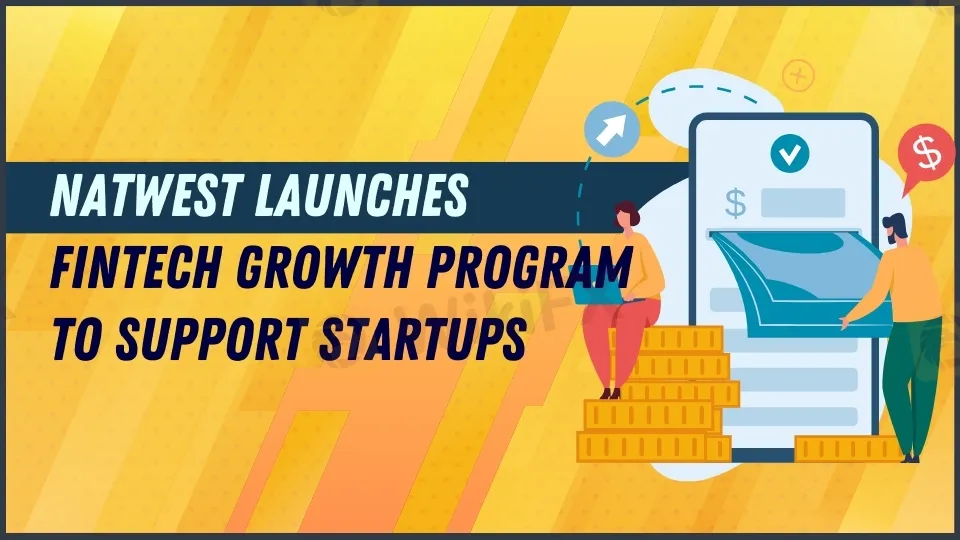简体中文
繁體中文
English
Pусский
日本語
ภาษาไทย
Tiếng Việt
Bahasa Indonesia
Español
हिन्दी
Filippiiniläinen
Français
Deutsch
Português
Türkçe
한국어
العربية
NatWest Launches FinTech Growth Program to Support Startups
Abstract:NatWest unveils a new FinTech Growth Program to help UK startups. The initiative focuses on scaling FinTech companies with resources and expert guidance.

NatWest Announces FinTech Growth Program to Help UK Startups
NatWest, a British bank, has announced the introduction of its FinTech Growth Programme, which will assist developing FinTech businesses in the United Kingdom in scaling up. The initiative, which was launched on December 4, intends to empower emerging businesses with the resources, networks, and experience of a large financial institution. NatWest thinks that this program will boost its own innovation efforts while also aiding the expansion of the innovation economy.
“This program lays a pathway to create better outcomes for our customers,” said David Grunwald, Director of NatWest Innovation. “Working this closely with FinTechs and UK entrepreneurs strengthens our ability to be future-focused while supporting the growth of the innovation economy.”
The program will choose five FinTechs that will focus on addressing important difficulties in the payment industry, which is a chronic issue in today's increasingly digital society. Startups must be situated in the United Kingdom and in the pre-Series A stage. Participants will get access to seminars, mentorship, and coaching sessions over the course of ten weeks to enable them to co-create ideas for banking's future.

This program is part of NatWest's wider effort to collaborate with early-stage FinTechs and entrepreneurs and provide them with opportunities to learn from one another. The small group of startups will be able to network with other FinTechs, learn from experienced coaches, and benefit from NatWest's Innovation department to expand their networks.
Industry analysts have stressed the increasing relevance of bank-finTech collaborations. According to PYMNTS, these relationships are critical to driving the adoption of open banking and overcoming hurdles in creating new products. While banks frequently suffer with out-of-date systems, FinTechs are more nimble and may try new ideas with less regulatory oversight.
“These bank-FinTech partnerships allow everyone to bring what theyre best at to the table,” said Moa Agrell, Senior Banking Relations Manager at Trustly. This means banks may make use of FinTechs' quick innovation capabilities, while FinTechs get access to industry knowledge, regulatory experience, and the trust created by established financial institutions.
According to Agrell, these collaborations may benefit all parties involved: “It can be a win for the bank, a win for merchants, a win for consumers, and a win for the industry overall.”
Meanwhile, as reported earlier this week, the Federal Deposit Insurance Corporation (FDIC) is considering new rules that may affect such partnerships.
Final Thoughts:
NatWest's FinTech Growth Program promotes innovation and helps UK firms develop. FinTechs may promote financial sector advancement by combining their skills and resources with those of a large bank. As bank-FinTech partnerships expand, they have the potential to transform the future of banking and financial services, benefiting businesses, consumers, and the economy as a whole.

Disclaimer:
The views in this article only represent the author's personal views, and do not constitute investment advice on this platform. This platform does not guarantee the accuracy, completeness and timeliness of the information in the article, and will not be liable for any loss caused by the use of or reliance on the information in the article.
Read more

Authorities Alert: MAS Impersonation Scam Hits Singapore
MAS scam alert: Scammers impersonate officials, causing $614K losses in Singapore since March 2025. Learn how to spot and avoid this impersonation scam.

Billboard Warns of Crypto Scams Using Its Name – Stay Alert!
Billboard warns against fake crypto scams using its brand. Learn how to spot fraud and protect yourself from fake promotions.

Rising WhatsApp Scams Highlight Need for Stronger User Protections
UK consumers lose £2,437 on average to WhatsApp scams. Revolut demands stricter verification and AI monitoring to combat rising fraud on Meta platforms.

Interactive Brokers Launches Forecast Contracts in Canada for Market Predictions
Interactive Brokers introduces Forecast Contracts in Canada, enabling investors to trade on economic, political, and climate outcomes. Manage risk with ease.
WikiFX Broker
Latest News
TradingView Brings Live Market Charts to Telegram Users with New Mini App
Trump tariffs: How will India navigate a world on the brink of a trade war?
Interactive Brokers Launches Forecast Contracts in Canada for Market Predictions
Authorities Alert: MAS Impersonation Scam Hits Singapore
Stocks fall again as Trump tariff jitters continue
INFINOX Partners with Acelerador Racing for Porsche Cup Brazil 2025
Regulatory Failures Lead to $150,000 Fine for Thurston Springer
April Forex Trends: EUR/USD, GBP/USD, USD/JPY, AUD/USD, USD/CAD Insights
March Oil Production Declines: How Is the Market Reacting?
Georgia Man Charged in Danbury Kidnapping and Crypto Extortion Plot
Currency Calculator







